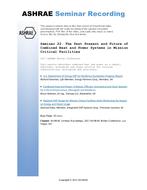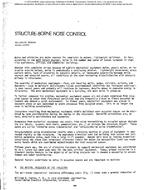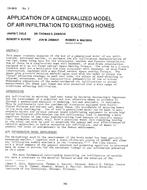In order to design an air distribution system which meets acoustic specifications, the designer should be able to estimate both the sound power levels produced by the various sources and the attenuating characteristics of the ductwork. The sound sources include the fan (or fans), the ductwork and fittings, and the terminal devices. The present study deals with duct fitting elements, specifically 90 deg elbows and branch take-offs.
Duct fittings in general exhibit two distinct acoustical characteristics: sound attenuation and generation.
In view of the serious lack of data relating to aerodynamic sound generation by duct elements, ASHRAE Technical Committee 1.7 in 1963 initiated and sponsored research project RP-37. The work was done at Research in Acoustics, Inc. during the period of 1963-1965 using test facilities especially built for this project. The duct elements studies included abrupt and gradual duct transitions, elbows, branch take-offs, dampers, and cylindrical rods. Some of the experimental results were summarized in a subsequent paper although no general correlations of the results were provided.
A study of the final report for the RP-37 project indicated that practical correlations of the data would be possible. In order to transform the wealth of original test data into a more general and useful form, the study reported herein was initiated with the following objectives:
- To correct the original data where necessary for the effects of reverberant room ambient noise, air supply system noise, and inlet and outlet duct attenuations.
- To apply the appropriate end reflection corrections to all duct outlet sound measurements.
- To correlate the corrected data for elbows and branch take-offs in diinensionless terms which would allow extension of the data to other geometries and air flow rates.
Citation: ASHRAE Transactions, Volume 76, Part 2, Kansas City, MO
Product Details
- Published:
- 1970
- Number of Pages:
- 13
- File Size:
- 1 file , 890 KB
- Product Code(s):
- D-KA-2147


